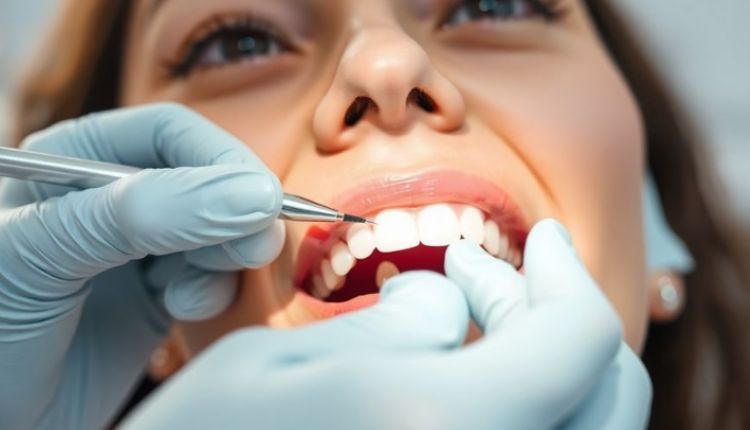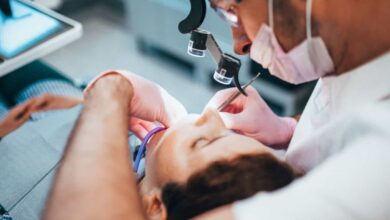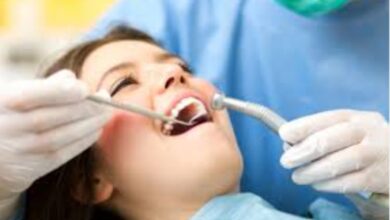Understanding Dental Emergencies

Dental emergencies can be scary, and knowing what to do can make all the difference. This section will help you understand what constitutes a dental emergency and how to recognize the signs that you need to seek immediate care. Finding the best emergency dentist in Oakville for immediate relief starts with knowing when you need one!
Types of Dental Emergencies
So, what exactly counts as a dental emergency? It’s more than just a little toothache. Here are some situations that definitely warrant a trip to the emergency dentist:
- Severe Toothache: A toothache that just won’t quit, especially if it’s accompanied by swelling or fever, is a major red flag.
- Knocked-Out Tooth: This is probably the most obvious emergency. Time is of the essence to try and save the tooth.
- Broken or Cracked Tooth: Significant damage to a tooth can cause intense pain and needs to be addressed quickly to prevent further complications.
- Abscess: A painful infection around a tooth or in the gums. These can spread quickly and become very serious.
- Lost Filling or Crown: While not always as urgent as other issues, a lost filling or crown can expose the sensitive inner layers of your tooth, causing pain and increasing the risk of infection.
Signs You Need Immediate Care
Sometimes it’s not so obvious whether you need to rush to the dentist. Here are some signs that indicate you should seek immediate dental care:
- Uncontrollable Bleeding: Bleeding in the mouth that doesn’t stop with pressure.
- Severe Pain: Pain that is unbearable and doesn’t respond to over-the-counter pain relievers.
- Swelling: Significant swelling in the mouth, face, or neck.
- Difficulty Breathing or Swallowing: This could indicate a serious infection that needs immediate attention.
- Trauma or Injury: Any injury to the mouth or teeth that results in significant damage or displacement.
Common Causes of Dental Emergencies
Dental emergencies can happen for a variety of reasons. Here are some of the most common culprits:
- Poor Oral Hygiene: Neglecting to brush and floss regularly can lead to cavities, gum disease, and other problems that can escalate into emergencies.
- Trauma or Injury: Accidents, sports injuries, or falls can cause teeth to break, crack, or get knocked out.
- Eating Hard Foods: Biting down on something too hard can fracture a tooth.
- Grinding or Clenching Teeth: This can put excessive pressure on your teeth, leading to cracks, fractures, and jaw pain.
- Untreated Dental Issues: Small problems like cavities can worsen over time and eventually turn into emergencies if left untreated.
Ignoring a dental emergency can lead to more serious health problems down the road. Infections can spread, pain can worsen, and you could even lose teeth. It’s always best to err on the side of caution and seek professional help if you’re unsure.
How to Find an Emergency Dentist in Oakville
Finding yourself in a dental crisis can be stressful, but locating a reliable emergency dentist oakville doesn’t have to be. Here’s a breakdown of how to find immediate dental care when you need it most.
Researching Local Options
Start by identifying dental clinics in Oakville that specifically advertise emergency dental services. Many general dentists also accommodate emergency cases, so don’t limit your search. Here’s how to broaden your search:
- Online Search: Use search engines to look for “emergency dentist Oakville” or “urgent dental care near me.”
- Local Directories: Check online directories for dentists in your area, filtering by those offering emergency services.
- Ask for Referrals: If you have a regular dentist, call their office. Even if they can’t see you immediately, they might recommend a trusted colleague who can.
Checking Availability and Hours
Confirm that the dentist’s hours align with your needs. Dental emergencies rarely happen at convenient times, so look for clinics with extended hours or weekend availability. Consider these points:
- 24/7 Availability: Some clinics offer round-the-clock emergency services.
- After-Hours Contact: Check if the dentist has an emergency contact number for after-hours situations.
- Same-Day Appointments: Inquire about the possibility of getting a same-day appointment for urgent cases.
Reading Reviews and Testimonials
Before committing to a particular dentist, take some time to read online reviews and testimonials. This can provide valuable insights into the quality of care and patient experience. Look for patterns in the feedback:
- Patient Experiences: Pay attention to comments about the dentist’s demeanor, communication skills, and ability to handle emergencies.
- Treatment Outcomes: Look for reviews that mention successful treatments and positive results.
- Response Time: See if patients comment on how quickly the dentist responded to their emergency.
Finding the right emergency dentist can make a huge difference in your experience. Take the time to do your research, check availability, and read reviews. This will help you find a dentist who can provide the prompt and effective care you need during a dental emergency.
What to Expect During an Emergency Dental Visit
So, you’ve got a dental emergency and you’re heading to the dentist. What happens next? It’s good to have an idea of what to expect during an emergency dental visit to help ease any anxiety you might be feeling. The dentist will focus on relieving your pain and addressing the immediate problem. Here’s a breakdown:
Initial Assessment and Diagnosis
First things first, the dentist will want to figure out what’s going on. This usually involves:
- A quick chat: They’ll ask you about your symptoms, when they started, and your medical history.
- An exam: The dentist will take a look at your mouth, teeth, and gums to identify the problem area.
- X-rays (maybe): Depending on the situation, they might need to take X-rays to get a better view of what’s happening beneath the surface.
Treatment Options Available
Once they know what’s wrong, the dentist will discuss your treatment options. This could include:
- Pain relief: This is usually the first priority. They might give you a local anesthetic to numb the area.
- Repair work: If you have a broken or chipped tooth, they might be able to fix it with a filling or crown.
- Extraction: In some cases, like a severely damaged or infected tooth, extraction might be necessary.
- Root canal: If the pulp of your tooth is infected, a root canal might be needed to save the tooth.
- Antibiotics: If you have an infection, they might prescribe antibiotics to clear it up.
Post-Treatment Care and Follow-Up
After the emergency treatment, the dentist will give you instructions on how to care for your mouth at home. This might include:
- Pain management: They might recommend over-the-counter pain relievers or prescribe something stronger.
- Oral hygiene: They’ll tell you how to brush and floss gently to avoid irritating the area.
- Dietary restrictions: You might need to avoid certain foods or drinks for a while.
- Follow-up appointment: Depending on the treatment, you might need to come back for a follow-up appointment to make sure everything is healing properly.
It’s important to follow the dentist’s instructions carefully to ensure a smooth recovery. Don’t hesitate to call them if you have any questions or concerns after your visit. They’re there to help you get back to feeling your best!
Preventing Dental Emergencies
It’s way better to avoid a dental emergency than to deal with one, right? While you can’t prevent every single thing, there are definitely steps you can take to seriously lower your risk. Think of it like this: a little effort now can save you a lot of pain (and money!) later. Let’s dive into some practical ways to keep your smile healthy and avoid those unexpected trips to the emergency dentist in Oakville.
Regular Dental Check-Ups
Seriously, don’t skip these! Regular check-ups are like hitting the reset button for your mouth. Your dentist can spot potential problems way before they turn into full-blown emergencies. They can catch things like:
- Small cavities before they become massive toothaches.
- Early signs of gum disease.
- Cracks or weaknesses in your teeth that could lead to breaks.
Plus, they’ll give your teeth a professional cleaning, which is something your toothbrush just can’t do.
Protective Gear for Sports
If you play any kind of sport where there’s a chance of getting hit in the face, a mouthguard is a must. It’s not just for football players, either. Basketball, hockey, even skateboarding – anything where your mouth could take a beating. A custom-fitted mouthguard from your dentist is the best option, but even an over-the-counter one is better than nothing. Trust me, it’s way cheaper than fixing a broken tooth.
Maintaining Good Oral Hygiene
This one’s a no-brainer, but it’s worth repeating. Good oral hygiene is the foundation of a healthy mouth. That means:
- Brushing your teeth twice a day with fluoride toothpaste.
- Flossing every day to get rid of plaque and food particles between your teeth.
- Using mouthwash to kill bacteria and freshen your breath.
Think of your mouth like a garden. If you don’t water it (drink enough water), weed it (floss), and fertilize it (brush with fluoride toothpaste), things are going to go south pretty quickly. A little daily maintenance goes a long way in preventing dental disasters.
Emergency Dental Services Offered in Oakville
When you’re facing a dental emergency, knowing what services are available can bring some peace of mind. A good dentist in Oakville will offer a range of immediate treatments to address your urgent needs. Let’s take a look at some common emergency services.
Tooth Extractions
Sometimes, a tooth is too damaged to save. In these cases, an emergency tooth extraction might be necessary. This could be due to severe decay, trauma, or a serious infection. The process involves:
- Assessment of the damaged tooth and surrounding area.
- Administering local anesthesia to numb the area.
- Carefully removing the tooth while minimizing trauma to the surrounding tissues.
Root Canals
If you have a severely infected tooth, a root canal might be the only way to save it. This procedure involves:
- Removing the infected pulp from inside the tooth.
- Cleaning and disinfecting the root canal.
- Filling and sealing the canal to prevent further infection.
- Placing a dental crown oakville to protect the tooth.
Treatment for Oral Infections
Oral infections can be painful and dangerous if left untreated. Emergency treatment often includes:
- Diagnosing the type and severity of the infection.
- Prescribing antibiotics to combat the bacteria.
- Draining any abscesses to relieve pressure and remove pus.
- Providing pain management to keep you comfortable.
It’s important to remember that emergency dental care isn’t just about fixing the immediate problem. It’s also about preventing further complications and ensuring your long-term oral health. Don’t hesitate to seek help if you’re experiencing a dental emergency. Many dentists also offer cosmetic dentistry oakville and invisalign oakville, but those are not emergency services.
Cost Considerations for Emergency Dental Care
Let’s be real, nobody wants a dental emergency, but they happen. And when they do, the last thing you want to worry about is the cost. But, let’s face it, cost considerations are a big deal. Here’s a breakdown of what to expect when it comes to paying for emergency dental care in Oakville.
Insurance Coverage Options
Navigating dental insurance can feel like a root canal without anesthesia, right? Here’s the deal:
- Check Your Policy: First things first, dig out your dental insurance policy and see what it covers for emergency services. Some plans have specific clauses about what’s considered an emergency and what percentage they’ll cover.
- Waiting Periods: Be aware of any waiting periods. Some policies require you to be enrolled for a certain amount of time before you can claim benefits for major procedures.
- Annual Maximums: Keep in mind your annual maximum. Emergency treatment can eat into that pretty quickly, leaving you to pay out-of-pocket for anything beyond that limit.
Payment Plans and Financing
Okay, so insurance isn’t covering as much as you hoped. Don’t panic! Many dental offices offer payment plans or financing options to help spread out the cost:
- In-House Payment Plans: Some dentists offer their own payment plans, allowing you to pay off the balance in installments over a set period.
- Third-Party Financing: Companies like CareCredit specialize in healthcare financing. You can apply for a line of credit to cover the cost and then pay it back over time.
- Credit Cards: While not ideal, using a credit card can be a temporary solution, especially if you have one with a low interest rate or rewards program.
Average Costs for Common Procedures
To give you a ballpark idea, here are some average costs for common emergency dental procedures:
- Emergency Exam: This can range from $75 to $150, depending on the clinic.
- Tooth Extraction: Simple extractions might cost between $150 and $300, while more complex ones (like impacted wisdom teeth) can be significantly more.
- Root Canal: This is where things get pricey. Depending on the tooth, a root canal can cost anywhere from $700 to $1500 or more.
- Fillings: Emergency fillings can range from $200 to $400, depending on the material used.
It’s important to remember that these are just averages. The actual cost will depend on the specific situation, the dentist’s fees, and your location. Always ask for a detailed estimate before agreeing to any treatment.
Aftercare and Recovery from Dental Emergencies
So, you’ve just seen an emergency dentist in Oakville – that’s a relief! But the journey doesn’t end there. Proper aftercare is super important to make sure everything heals well and you don’t run into more problems down the road. Think of it like this: the dentist fixed the immediate crisis, and now it’s your job to help your mouth recover fully. It’s all about following instructions and being patient.
Managing Pain and Discomfort
Okay, let’s be real, you’re probably still feeling some pain. Here’s how to deal:
- Medication is your friend: Take any prescribed pain meds exactly as directed. Don’t skip doses or try to tough it out if you don’t have to. Over-the-counter stuff like ibuprofen can also help.
- Cold compress: Apply an ice pack to your cheek for 15-20 minutes at a time, several times a day. This helps reduce swelling and numb the area.
- Soft foods only: Stick to soft foods like yogurt, soup, and mashed potatoes for the first few days. Avoid anything hard, crunchy, or chewy that could irritate the area.
Listen to your body. If something doesn’t feel right, don’t hesitate to call your dentist. It’s always better to be safe than sorry.
Signs of Complications to Watch For
Even with the best aftercare, sometimes things can go wrong. Keep an eye out for these signs:
- Increased pain or swelling: If your pain gets worse instead of better, or if the swelling increases, it could be a sign of infection.
- Fever: A fever is another sign that your body is fighting off an infection.
- Pus or drainage: Any pus or drainage from the treated area is a major red flag.
- Numbness that doesn’t go away: Some numbness is normal after certain procedures, but if it persists for more than a day or two, let your dentist know.
When to Schedule a Follow-Up Appointment
Your dentist will probably want to see you for a follow-up appointment to check on your progress. Make sure you schedule it and don’t skip it! This is your chance to ask any questions and make sure everything is healing as it should be. Usually, these appointments are scheduled within a week or two after the emergency visit, but it depends on the specific situation. Don’t be afraid to call and ask if you’re unsure.




